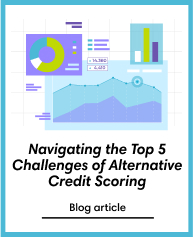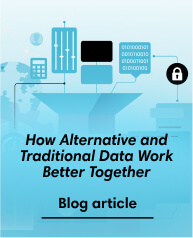Credit Scoring
Jul 7, 2022
How To Integrate Alternative Credit Scoring: A Beginner's Guide
Subscribe to our newsletter
Trust is essential in any financial organisation. Credit companies, for example, must assess whether their customers can repay the loan before granting it, in other words assessing the confidence level of the customers’ creditworthiness. Traditional credit scores, based on a person's financial history, have long been considered a well founded indicator of a customer's reliability. However, with the emergence of artificial intelligence and alternative data, this tool has evolved, expanding the creditworthiness parameters while reducing fraud and preventing economic losses for lenders more efficiently.
Traditional credit scoring pain points
Although the criteria used in the different credit reports could vary according to each institution, all traditional credit studies determine the chances of someone getting a loan through credit history. Credit history is a record that gathers all the financial data of a person, such as:
- Payment history: If payments are made on time, payment frequency, and when these payments are due.
- Credit utilisation: How much a person owes on loans and credit cards.
- Length of credit history: The longer the person's payment history, the higher the score.
- Combination of existing credits and account types: If a person has a combination of accounts, including instalment loans, home loans, credit and retail cards.
- Recent Credit Activity: If a person recently opened many new accounts, it could suggest potential financial problems and lower the score.
However, one of the biggest problems with credit history is that it is limited to the data within the banking system. Thus, millions of people who are unbanked but are trustworthy (such as gen Z, millennials, immigrants or informal workers) are most likely to get a bad score, losing the possibility of acquiring a secure loan. Therefore, some finally apply for informal credit, getting into a debt trap.
In addition, traditional credit scoring assessments are manual and tedious and do not have the technology necessary to include behavioural data. In this way, they cannot qualify millions of clients simultaneously or expand their offer outside the financial system without incurring high risks.
Therefore, alternative credit scoring arises from the need to serve thin-file customers, forming the majority of underbanked and unbanked potential borrowers, especially in emerging markets. Now, lenders could boost financial inclusion and grow by tapping new unexplored segments!
A new way to assess people with alternative data
Alternative credit scoring beats the traditional credit methodologies by using machine learning algorithms and new alternative data sources related to people’s behaviours, such as:
- Rental payment and subscriptions
- Emails
- Social networks behaviours
- Financial reports
- Geolocations
The growth of alternative data is exponential, powered by the fact that more and more users are storing information on the network, generating new data daily. In this way, in contrast to traditional scoring, alternative scoring has the capacity to anticipate movements and obtain more accurate patterns of an applicant’s willingness to pay.
These innovative data enrichment systems can complete a person’s profile in real-time, allowing companies to understand their prospects better and make substantially more informed decisions. In fact, including these thin-file customers represents an interesting growth opportunity for many businesses. For instance, millennials (despite their lack of financial profiles) represent the largest adult cohort in the world, making up 23% of the global population.
Alternative data also improves a company’s self-knowledge. A large amount of existing alternative data allows institutions to perceive their performance more accurately. The connection of these insights enables companies to correctly interpret how they are perceived by people, comparing themselves against competitors, suppliers, and other secure connection networks

Alternative scoring challenges: How to integrate multiple data
Data sources are increasingly diverse today, so businesses must organise them and identify the ones that are most relevant. Integrating multiple credit scores in one single model can be difficult, but the predictive power increases once more scores are ingested into the model. Nevertheless, this is only true if the scores (and the underlying data sources) have little correlation with each other.
Another important aspect to consider is the legal angle of information. Personal data collection and use are regulated differently in each region. It is imperative to understand the legal terms that govern the storage of information, where the information originates, the implementation limitations, and how it should be used correctly and ethically. Credolab complies with all existing regulations because the data collected is consented by clients and is in the form of anonymous metadata without any Personally Identifiable Information (PII) ever leaving the device.
A deep dive into behavioural data
New scoring models based on machine learning provide behavioural insight, providing a holistic view of human beings. “Some obvious behavioural data sources include psychometric data, device data and web browsing data. Some companies that use behavioural data (psychometric and non-traditional applicant data) are Aire, EFL and ConfirmU. ConfirmU, for example, has experts from the fields of psychology, psychometrics, technology, data science, gamification and risk analytics, all contributing to creating a highly predictive tool for credit risk.
Credolab only collects unique user behavioural data once from each borrower. Therefore, each user’s behavioural data is unique and does not change significantly over time. There are more than 10 million features created for each applicant, such as:
- Weekly events created,
- Apps installed in a week,
- Registered accounts,
- Updated apps
What attributes are most predictive?
Credolab tailor-makes each scorecard for each client. As such, and given the enormous amount of behavioural features that credolab calculates, it is difficult to pinpoint the individual attributes that are always predictive, as not one client is ever the same. Here are a few examples of the macro-categories of data credolab collects and processes that contribute to the likelihood of loan payment are:
- Calendar – A higher number of events scheduled during the working hours of working days may show a higher willingness to pay.
- Contacts – A lower number of contacts with more than one phone number may tend to indicate a lower willingness to pay.
- Application – A higher number of gambling apps installed may indicate the customer is associated with high-risk behaviour and more likely to default.
Behavioural analysis benefits
By combining digital footprint lookups with behavioural data, lenders can obtain at least four advantages over the competition:
- More pleasant customer journey: Beyond what is mandated by law, only those customers found to be less trustworthy based on their risk scores will need to be asked for additional documentation and/or information at underwriting, with different levels of hard or soft checks per customer – according to lender preferences.
- Proactive assessment for faster results: This also allows for pre-KYC monitoring and first assessment. By investigating mobile and web metadata and emails and phone numbers at sign-up, more obvious attempts at fraud are blocked, freeing up valuable resources and making systems and processes safer.
- Optimised workload management: Moreover, any potentially problematic applicants (those with middle-of-the-road initial risk ratings) can also be flagged to give the team a better prediction and understanding of the affordability and underwriting workload ahead.
- Privacy-first appreciated by customers: Because customers are only asked for the minimum of what is required for their particular case, privacy concerns will be covered, with the privacy-minded not experiencing intrusion or insult. Meanwhile, the data collected is compliant with privacy legislation. It is public, open data helping to gauge patterns of behaviour that identify customers’ legitimacy and truthfulness – not their private information.
To sum up, lending is about trust. Therefore, new alternative credit scoring, based on digital footprints and behavioural metadata, is the most innovative tool that gives lenders a holistic view of their customers in real-time, reducing risk and expanding their client portfolio. As a consequence, financial inclusion is evolving from a desire into a reality.
Interested in learning how our products can help you? Request a free demo, or drop us your questions here.
Access data insights solutions that deliver growth - Fraud detection | Credit scoring | Marketing segmentation. Helps you say "YES" more confidently to more customers!
Learn more about credolab's products and possibilities with our features through our Blog section, and feel free to share our content with your team!
Follow us on social or get in touch today: Book a meeting | Blog | LinkedIn | Twitter |Contact Us





